
Amazon FBA Private Labeling: Everything You Need to Know

Table of Contents
- Introduction
- What Is a Private Label on Amazon?
- What Are the 4 Types of Private Labels?
- What Are the Pros and Cons of Amazon Private Labeling?
- What Is an Example of a Private Label Product?
- What Is the Difference Between Amazon FBA and Private Label?
- What Are the Requirements for Amazon Private Labeling?
- Do You Need a Trademark to Private Label on Amazon?
- Where Can I Source Private Label Products From?
- How Do I Find the Best Private Label Manufacturer?
- How Much Does Private Labeling Cost?
- Is Private Labeling on Amazon Still Profitable?
- Is Amazon Private Labeling Worth It?
- Getting Started With Private Labeling on Amazon
- Sign Up for Amazon Brand Registry
- Identify Profitable Products to Sell
- Find a Reputable Manufacturer
- Request Product Samples for Quality Control
- Select Your Brand's Logo, Design, and Packaging
- Choose Your Fulfillment Method
- Create Your Listing
- At the End of the Day
Introduction
So you’ve ascended into the world of e-commerce and stumbled upon various ways to make money online.
You’re wide-eyed excited!
There’s dropshipping, where you sell products without ever touching them. Sounds intriguing.
Arbitrage, the art of buying low and selling high, seems like a savvy financial move albeit a bit of a hustle.
Self-publishing has been on your radar. Kindle Direct Publishing offers a low-barrier-to-entry and a creative outlet for the part of yourself that aspires to be an author.
But then there’s private labeling, a method of selling online where the product is truly yours. It may be a less-known avenue, but it’s certainly a highly lucrative on. Is it the right one for you?
In this blog, let’s talk about everything you need to know about how to sell private label products — from what a private label product is to how to build an Amazon FBA private label brand and why it might just be the golden ticket you’ve been searching for. It’s time to demystify the intricacies of selling private label products so you can start selling your own product.
What Is a Private Label on Amazon?
Private label on Amazon refers to a business model where sellers offer their own branded products instead of reselling existing brands.
In this approach, Amazon sellers identify products with potential demand, often by leveraging market research tools such as Helium 10’s Chrome Extension and Black Box, before working with manufacturers or suppliers to create custom versions of these products, usually with unique packaging and branding.
These private label products are exclusively available under the seller’s brand on Amazon’s marketplace.
This strategy allows Amazon sellers to differentiate themselves, potentially enjoying higher profit margins, better control over product quality, and reduced competition compared to reselling established brands.
However like with anything, it’s not without its challenges. Hurdles to overcome may include managing product packaging, addressing customer service issues, navigating shipping costs (mostly if you are not using Fulfillment by Amazon), and adhering to Amazon’s brand restrictions.
Ranking well for relevant keywords, adding value to your niche of interest, winning the buy box and building a solid reputation can carry you forward in the competitive arena of private label Amazon business.
Outclass Your Competitors
Achieve More Results in Less Time
Maximize your results and drive success faster with Helium 10’s full suite of Amazon and Walmart solutions.
Sign Up for FreeWhat Are the 4 Types of Private Labels?
Now if you didn’t know, private labels can be categorized into four main types based on their positioning and target audience:
- Economy/Private Value Brands: These private label products are positioned as lower-cost alternatives to established brands. They cater to price-sensitive consumers who are looking for budget-friendly options without compromising too much on quality.
- Premium/Private Select Brands: Premium private label products aim to provide higher quality, often comparable to or even better than well-known brands. They target consumers willing to pay a bit more for superior quality and unique features.
- Copycat/Private Imitation Brands: These private label products closely mimic the packaging, design, and features of popular branded products. They capitalize on consumer familiarity with established brands but offer a more affordable option.
- Exclusive/Private Exclusivity Brands: Exclusive private label products are created for specific retailers, often in collaboration with manufacturers. These products are unique to a particular store or online marketplace and can only be found there.
Each type of private label serves a different market segment and strategy, allowing retailers to offer a diverse range of products and cater to various consumer preferences.
What Are the Pros and Cons of Amazon Private Labeling?
And like with anything, Amazon private labeling comes with an array of advantages and disadvantages for sellers, creating a multifaceted landscape for those contemplating this business model.
On the favorable side, starting an online business on Amazon with your own private label product means increased brand control. You have complete autonomy of the creation and management of a unique brand identity. You can design eye-catching packaging the way you wish to and employ innovative marketing strategies that translate into potential for higher profit margins, as direct engagement with manufacturers and suppliers allows for greater pricing control as well compared to the resale of established brands.
Private label business owners can also engage in the art of product differentiation. This allows them to create distinctive products with features or attributes that set them apart from competitors. This is particularly essential in a crowded marketplace. Such differentiation has the potential to cultivate customer loyalty and facilitate long-term growth, as customers gradually recognize and trust these unique brands.
And scalability is another advantage, granting sellers the flexibility to expand their product offerings within their chosen niche or venture into new niches as their own private label products business flourishes.
However, all this does not forego the initial investment that is required from those seeking to sell private label products, as significant resources are required for product development, branding, marketing, and inventory, resulting in substantial upfront costs.
The Amazon marketplace, known for its fierce competition, necessitates considerable effort and ingenuity for private label sellers to effectively differentiate their offerings and capture the attention of potential customers. Ensuring consistent product quality and protecting brand owners can pose considerable challenges, especially when sourcing products from various manufacturers or suppliers.
That goes hand in hand with the need for effective marketing efforts. Having private label on Amazon will demand substantial dedication in creating compelling product listings, running advertisements, and promoting the brand in an effort to gain visibility and drive sales. It does not mean it cannot be done. It just means it will require effort and you should hold reasonable expectations.
Moreover, the specter of unsold inventory can loom large, with underperforming products potentially tying up valuable resources.
Finally, the dependence on Amazon’s platform means that any alterations in their policies or algorithms can have immediate and far-reaching consequences for a private label business, necessitating adaptability and resilience in the massive giant’s ecommerce landscape.
Private labeling on Amazon offers the promise of reward and brand recognition, but it necessitates meticulous planning, thorough research, and diligent ongoing management to effectively navigate both its challenges and opportunities in the quest to secure the buy box and succeed in the competitive world of online retail stores.
What Is an Example of a Private Label Product?
An example of a private label product could be a “SuperiorBlend” brand of organic coffee beans sold exclusively on Amazon. Let’s do a walk through of the example in private labeling concept:
1. Product Selection: The seller identifies a niche in the coffee market using the Keywords tab inside of Helium 10’s Black Box. There’s a need for high-quality organic coffee beans.
2. Product Development: The seller partners with a coffee bean supplier to create a unique blend of organic coffee beans, ensuring superior taste and quality.
3. Branding and Packaging: The “SuperiorBlend” brand is created with a distinct logo and packaging design that emphasizes the organic and premium qualities of the product. They begin trademarking the brand so they can be brand registered on Amazon giving them access to exclusive features.
4. Listing on Amazon: The coffee beans are listed on Amazon under the “SuperiorBlend” brand name, with optimized product descriptions, images, and keywords.
5. Marketing and Promotion: The seller uses Amazon PPC ads and social media to promote the “SuperiorBlend” coffee, highlighting its premium and organic attributes.
6. Customer Engagement: The seller responds to customer inquiries and reviews promptly, ensuring a positive customer experience and building brand reputation.
7. Expansion: If the “SuperiorBlend” coffee gains popularity, the seller may consider expanding the product line to include different coffee blends or related products.
In this example, the “SuperiorBlend” brand represents a private label product. It’s a unique product created under a specific brand name, with customized branding, quality assurance, and marketing efforts aimed at differentiating it from other coffee options on Amazon.
Manage Everything With Next-Level Software
Sign up now to access powerful, easy-to-use tools to help with every part of selling on Amazon and Walmart.
What Is the Difference Between Amazon FBA and Private Label?
Amazon FBA (Fulfillment by Amazon) and private labeling are two distinct concepts that can often be combined as part of a selling strategy on the Amazon platform. Let’s clarify the differences between them:
Private labeling is a business model that involves creating your own brand of products and selling them on Amazon. It’s about developing unique products under your own brand name, rather than reselling established brands.
Whereas Fulfillment by Amazon (FBA) is a service offered by Amazon to help sellers store their products in Amazon’s fulfillment centers. When a customer places an order, Amazon handles the picking, packing, shipping, and customer service.
Here’s how FBA works. Sellers send their products to Amazon’s warehouses, where the products are stored until sold. You market the products and when a customer places an order for an FBA product, Amazon takes care of packaging and shipping the product to the customer. Amazon also handles customer inquiries, returns, and any issues related to the fulfillment process with you being the middle man every now and then to answer questions as they arise.
In summary, the key difference is that Amazon FBA is a service for handling order fulfillment and storage, while private labeling is a strategy for creating your own brand of products. Private label products can be sold using various fulfillment methods, including FBA, to take advantage of Amazon’s efficient logistics and customer service. So, you could combine private labeling with Amazon FBA to leverage both the benefits of unique branding and the convenience of Amazon’s fulfillment services.
What Are the Requirements for Amazon Private Labeling?
Amazon doesn’t have specific requirements that are exclusive to private labeling, but there are general requirements and best practices that apply to all sellers on the platform, including those who engage in private labeling. Here are the key aspects you need to consider:
1. Amazon Seller Account: You need to create an Amazon seller account to list and sell products on the platform. You can choose between an individual seller account (suitable for smaller businesses) or a professional seller account (recommended for those planning to sell a larger volume of products).
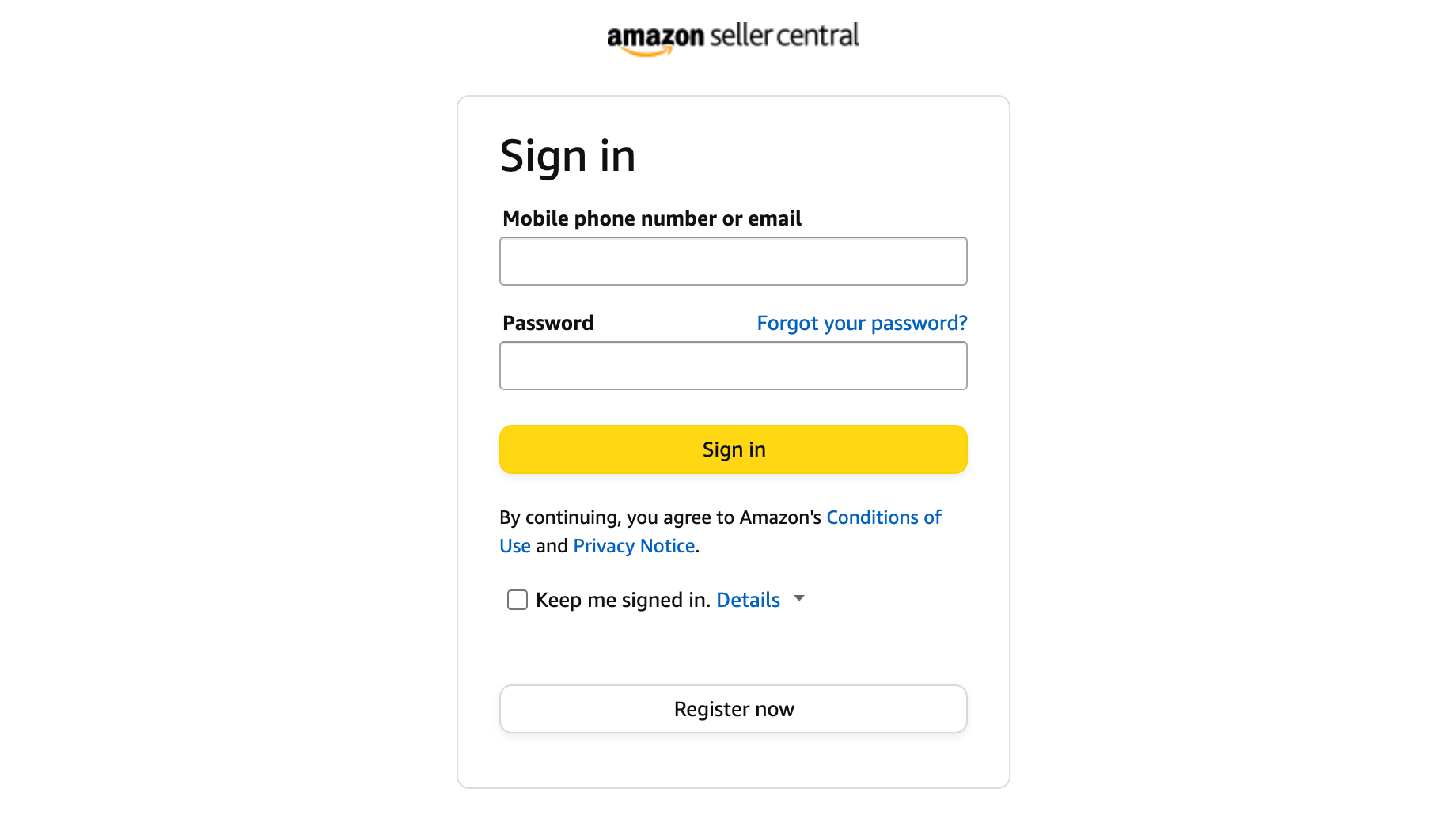
2. Product Quality and Compliance: Your private label products must meet Amazon’s product quality and safety standards. They should comply with relevant regulations and not pose any hazards to consumers.
3. Product Listings: Create accurate and detailed product listings with high-quality images, clear descriptions, and relevant keywords to attract potential customers. Listen to this podcast episode or read this blog with Emma Schermer Tamir from Marketing by Emma who has worked with hundreds of sellers to gain a better understanding of to approach writing and reoptimizing your listings.
4. Branding and Packaging: Develop your brand name, logo, and packaging design that sets your products apart from others. Ensure your packaging is professional and visually appealing. You can use a free platform like Canva if you don’t want to outsource through Upwork or Fiverr.
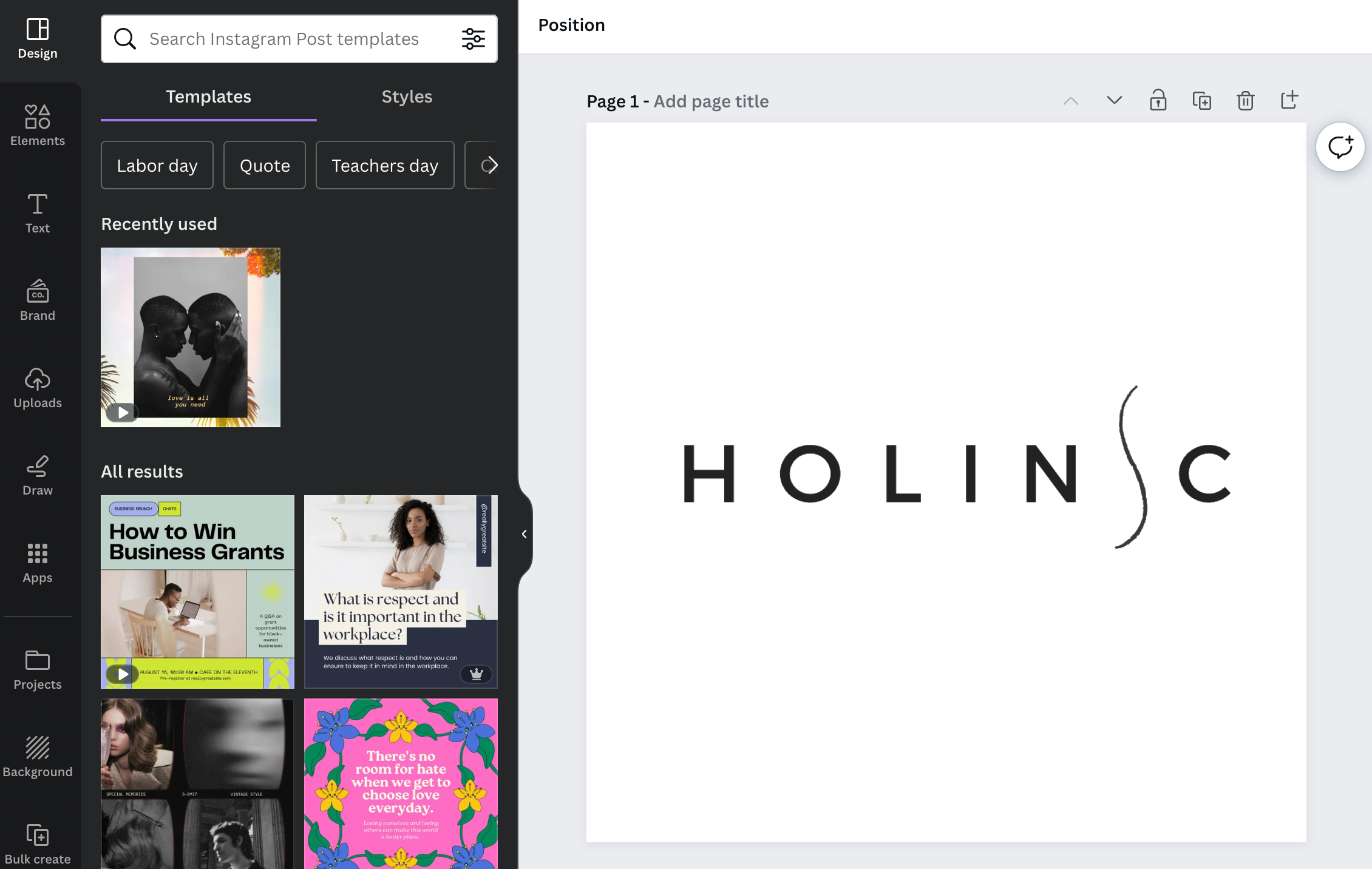
5. Product Reviews and Ratings: Positive reviews and ratings are crucial for building trust with customers. Provide excellent customer service and encourage buyers to leave reviews. Give a six star experience and they’ll leave you a five.
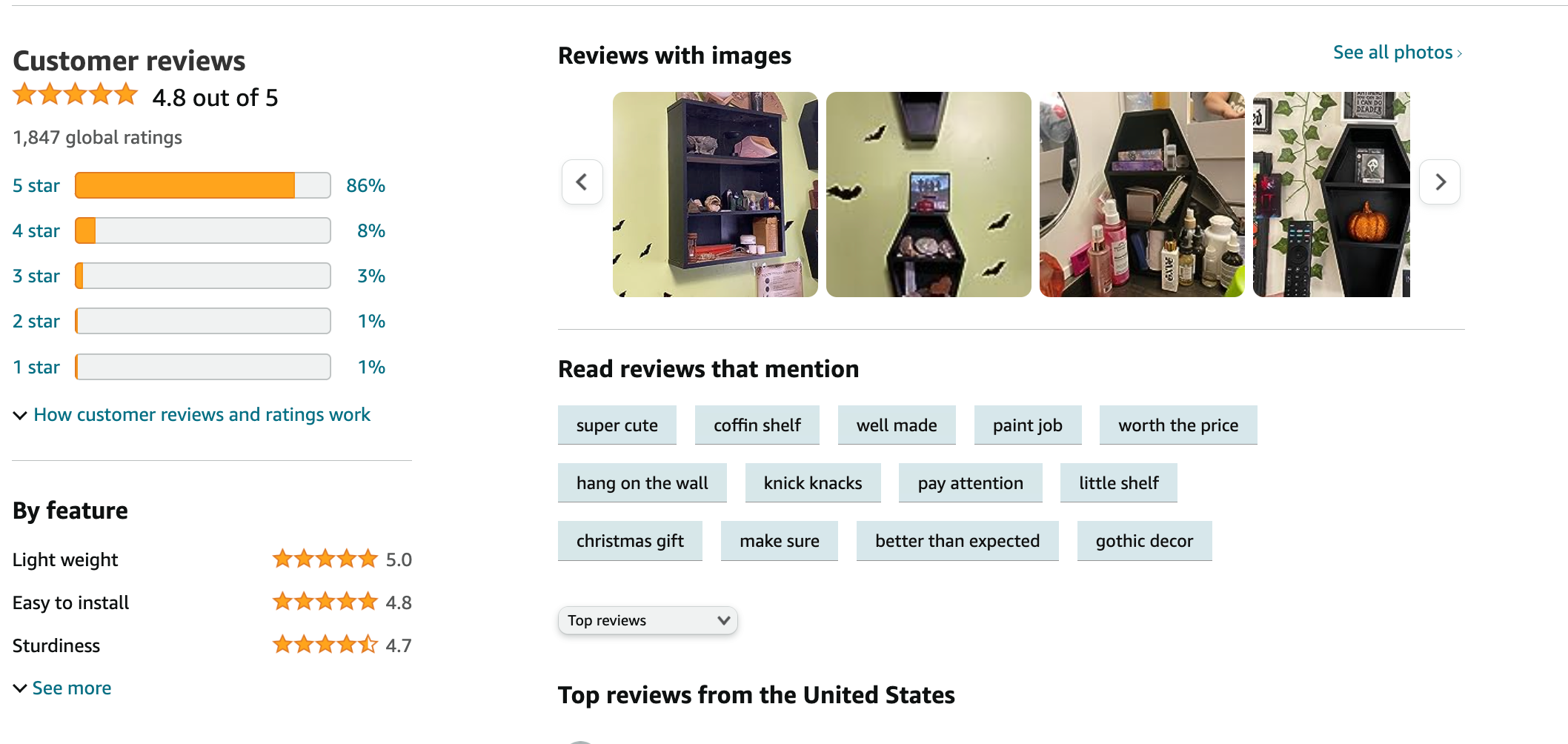
6. Intellectual Property Rights: Ensure that your private label products do not infringe on the intellectual property rights of other brands, including trademarks and patents. Do this before sourcing ideally so you prevent the mistake of spending thousands only to be cut off.
7. Product Research: Conduct thorough market research to identify profitable niches, understand customer preferences, and select products with potential demand. Use software tools like Black Box and Cerebro to save time, money and energy trying to comb through the millions of products available on Amazon. Sift data quickly based on parameters you have in mind to drive your decisions forward.
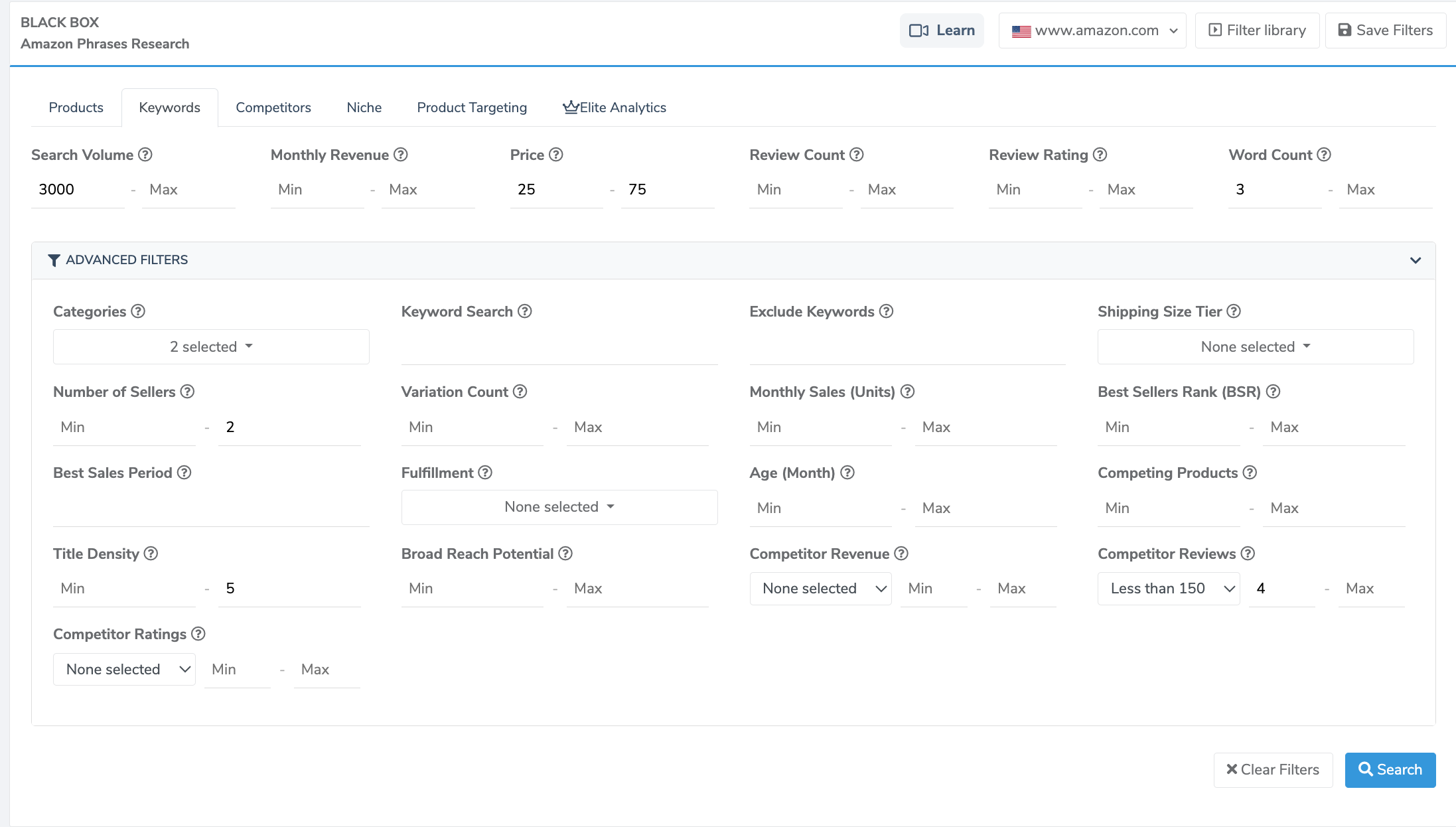
8. Supplier Management: Work with reliable manufacturers or suppliers who can produce your private label products to your quality specifications. Order a few samples and negotiate before choosing. Every dollar matters.
9. Inventory Management: Keep track of your inventory levels to avoid stockouts or excessive inventory that ties up your resources. You can use our Inventory Management tool to forecast inventory turnover and stay ahead.
10. Fulfillment Method: Decide whether you’ll fulfill orders yourself or use Amazon FBA to handle storage, shipping, and customer service. If you plan to fulfill orders yourself, you can look into 3PLs. We have some listed on our Seller Solutions Hub.
11. Marketing and Promotion: Develop a marketing strategy to promote your private label products on Amazon, which may include paid advertising, social media, and other promotional tactics. Amazon loves external traffic!
12. Legal Considerations: Ensure that you have all necessary business licenses, tax registrations, and comply with applicable laws and regulations.
It’s important to keep in mind that Amazon’s policies and requirements can change over time. Therefore, it’s recommended to review Amazon’s official seller guidelines and stay updated on any changes to ensure you’re operating within their terms and providing the best possible experience for your customers.
Do You Need a Trademark to Private Label on Amazon?
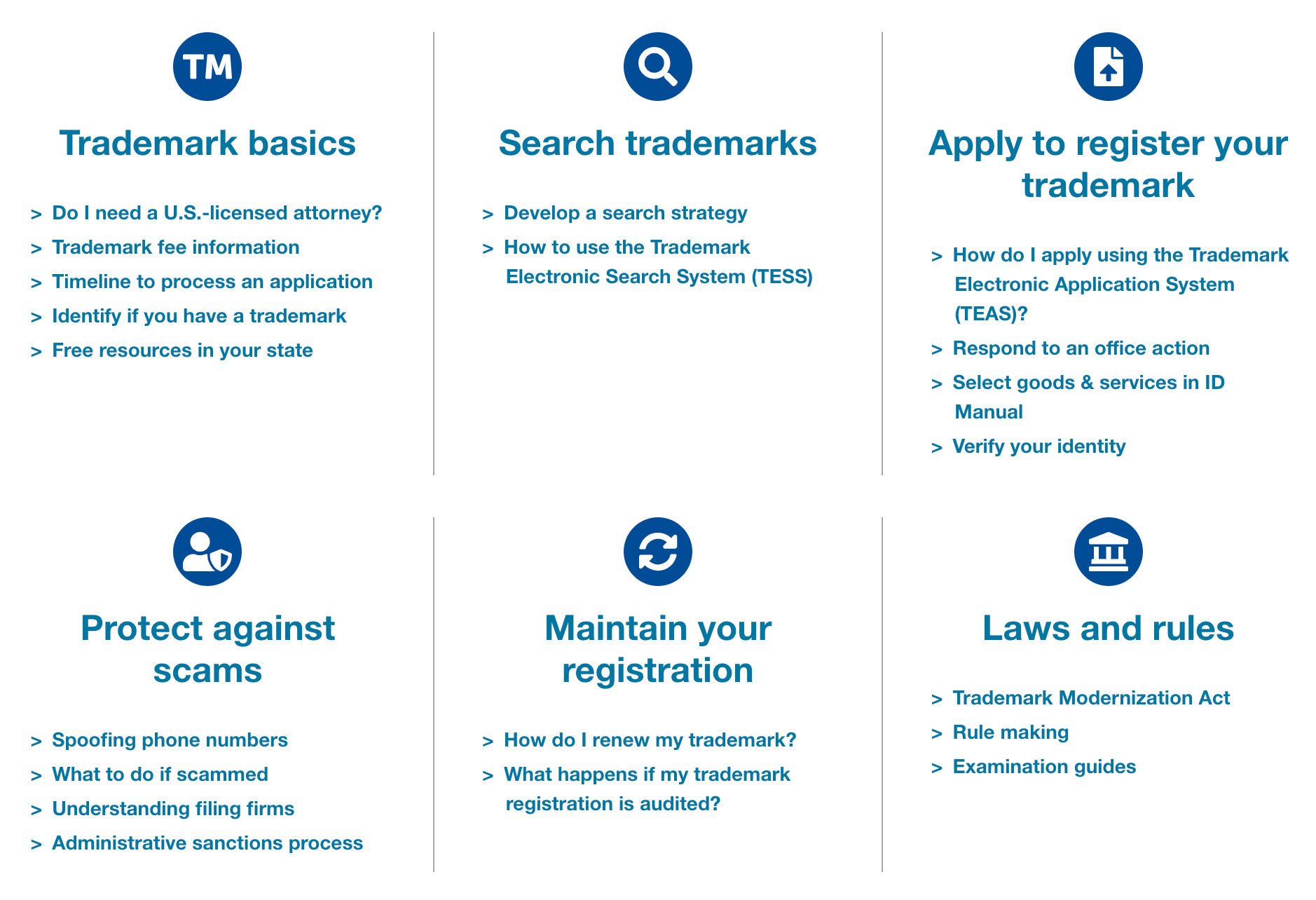
No, you do not necessarily need a trademark to start private labeling on Amazon.
You’ll be able to create your own brand name, design packaging, and list your products. However, without a trademark, you might have less legal protection against others using your brand name or selling similar products under a similar name. This could potentially lead to issues with brand identity, customer confusion, and even intellectual property disputes.
Having a trademark can offer you the benefit of:
Brand Protection: A registered trademark offers legal protection against others using your brand name or a similar name for similar products. This helps prevent brand confusion and potential loss of sales.
Amazon Brand Registry: Having a registered trademark can grant you access to Amazon’s Brand Registry program, which offers enhanced control over your brand’s product listings, helps in combating counterfeit products, and provides additional marketing tools.
IP Enforcement: With a trademark, you have the ability to enforce your rights more effectively against intellectual property infringements.
Brand Credibility: A registered trademark adds credibility to your brand and can increase consumer trust in your products.
It’s important to note that the trademark registration process can also take time and involves some costs up in the hundreds. If you’re serious about building a long-term brand on Amazon and have the additional funds, obtaining a trademark could be a worthwhile investment to safeguard your intellectual property and establish a strong brand presence.
Of course, always consult with legal professionals or trademark experts to understand the best course of action for your specific situation and location. Trying to do it yourself may require reapplying and extra costs if you do it incorrectly.
Manage Everything With Next-Level Software
Sign up now to access powerful, easy-to-use tools to help with every part of selling on Amazon and Walmart.
Where Can I Source Private Label Products From?
Your options are plentiful. There are several potential sources for private label products that you can consider when starting your Amazon private labeling venture. Here are some options:
Manufacturers and Suppliers: You can choose to work directly with manufacturers or suppliers, both domestically and internationally, to create and customize products according to your specifications. Websites like Alibaba, Global Sources, and Thomasnet can help you find potential partners.
Trade Shows: If you have the bandwidth to travel, you can attend industry-specific trade shows and exhibitions to meet manufacturers, suppliers, and distributors in person. This can provide you with the opportunity to see products, negotiate deals, and establish relationships.
Wholesale Companies: Some wholesale companies offer private label programs where they provide products that you can rebrand and sell as your own. This can be a quicker option compared to developing products from scratch.
Local Artisans or Craftsmen: For unique and handmade products, you can collaborate with local artisans or craftsmen to create custom items that resonate with your brand.
White Labeling: Some companies offer white-label products that you can customize with your branding. These products are often generic and can be a simpler way to start private labeling.
Private Label Manufacturers: Some manufacturers specialize in private label production across various product categories. They might offer a range of products you can choose from and customize.
Product Development Companies: These companies can help you with product design, development, and manufacturing, which can be especially helpful if you have a unique product idea.
OEM (Original Equipment Manufacturer) Partnerships: OEM manufacturers can create products based on your specifications and branding. This is common in industries like electronics.
Local Production: Depending on your niche, you might be able to find local producers who can create your products, ensuring quality and supporting local businesses.
How Do I Find the Best Private Label Manufacturer?
Finding the best private-label manufacturer requires careful research and evaluation on your part.
Always clearly outline the specifications, features, and qualities you want in your private-label products. This includes design, materials, dimensions, packaging, and any special features.
Conduct online research by using online platforms like Alibaba, Global Sources, and Thomasnet to search for potential manufacturers in your product category. Narrow down your search based on location, capabilities, and product specialization.
Check supplier directories.Industry-specific directories and databases can help you discover manufacturers and suppliers that meet your criteria. These directories can be found on trade association websites and industry platforms.
Attend trade shows and exhibitions. Participate in relevant trade shows, exhibitions, and industry events. This gives you the opportunity to meet manufacturers in person, view their products, and discuss potential partnerships.
Request samples.Before committing to a manufacturer, request product samples. Evaluate the quality, craftsmanship, and attention to detail of the samples to ensure they meet your standards.
Review credentials. Research the manufacturer’s background, history, and reputation. Check for reviews, ratings, and feedback from other clients. Look for any relevant certifications, licenses, or memberships in industry associations.
Communication and responsiveness. Reach out to potential manufacturers with detailed inquiries. Pay attention to their responsiveness, willingness to answer questions and communication style. A reliable manufacturer should be responsive and transparent.
Visit the manufacturer (if possible).If feasible, consider visiting the manufacturer’s facilities to see their production processes firsthand. This can provide valuable insights into their capabilities and operations.
Request references.Ask the manufacturer for references from other clients they have worked with. Contact these references to gather feedback about their experiences working with the manufacturer.
Negotiate terms.Discuss pricing, minimum order quantities, lead times, payment terms, and any customization options. Ensure that you have a clear understanding of all terms before finalizing the agreement.
Protect intellectual property. If necessary, consider drafting a non-disclosure agreement (NDA) or protecting your designs and ideas through patents or trademarks.
And start small. When starting a partnership with a new manufacturer, it’s a good idea, to begin with a smaller order to assess their reliability and product quality before scaling up.
Remember that finding the right manufacturer is a critical step in your private label journey. Take your time to research, ask questions, and make informed decisions to ensure a successful and long-lasting partnership.
How Much Does Private Labeling Cost?
Truthfully, there’s no real way to say. private labeling costs can vary widely based on factors like product complexity, branding, marketing, and more. Key cost components include product development, manufacturing, branding, packaging, shipping, storage, marketing, Amazon fees, quality assessment and miscellaneous expenses. Thorough budgeting is crucial to estimate costs accurately and maintain profitability.
Is Private Labeling on Amazon Still Profitable?
Private labeling on Amazon can still be profitable, but success depends on factors like niche selection, product differentiation, branding, quality auditing, marketing strategy, and leveraging Amazon’s platform. It offers opportunities to reach a wide customer base and benefit from efficient fulfillment through Amazon FBA. However, challenges like competition, initial investment, marketing efforts, changing algorithms, inventory management, and brand reputation must be carefully managed for sustained profitability. Thorough research, planning, and a commitment to quality and customer service are crucial for achieving profitability in the competitive Amazon marketplace.
Is Amazon Private Labeling Worth It?
Personally, yes. But whether you believe that is up to you.
Amazon private labeling can be worth it if you’re prepared for the initial investment in product development, branding, and marketing. It offers the potential for higher profits, brand control, and scalability, but it comes with challenges like competition, marketing efforts, and market uncertainties. Success depends on your commitment, differentiation strategies, and ability to navigate Amazon’s rules and fees. If you’re willing to invest time, effort, and resources while approaching it strategically, private labeling on Amazon can be a profitable and rewarding venture.
Getting Started With Private Labeling on Amazon
Sign Up for Amazon Brand Registry

To sign up for Amazon Brand Registry and start private label selling on the platform, you’ll need to follow a straightforward process.
Firstly, ensure your brand is eligible for registration. Typically, you should own a registered trademark for your brand, as this is a key requirement for enrollment. Once you have a registered trademark, you can visit the Amazon Brand Registry page and initiate the application process.
Prepare the necessary documents, including your registered trademark details, images of your product packaging with branding, and a list of product categories you plan to sell in.
Be sure to conduct market research to understand your target audience and the competition, especially other sellers within your niche.
Submit your application, and Amazon will review it. If approved, you’ll gain access to valuable tools and features, such as enhanced control over your product listings and protection against potential infringement issues. This enhanced control over your amazon private label product listings allows you to focus on product quality and better cater to your target audience, ensuring a strong position as the only seller for your brand.
Identify Profitable Products to Sell
There are many ways to do product research: in person, on Etsy, on Pinterest, even with keyword research tools like Cerebro.
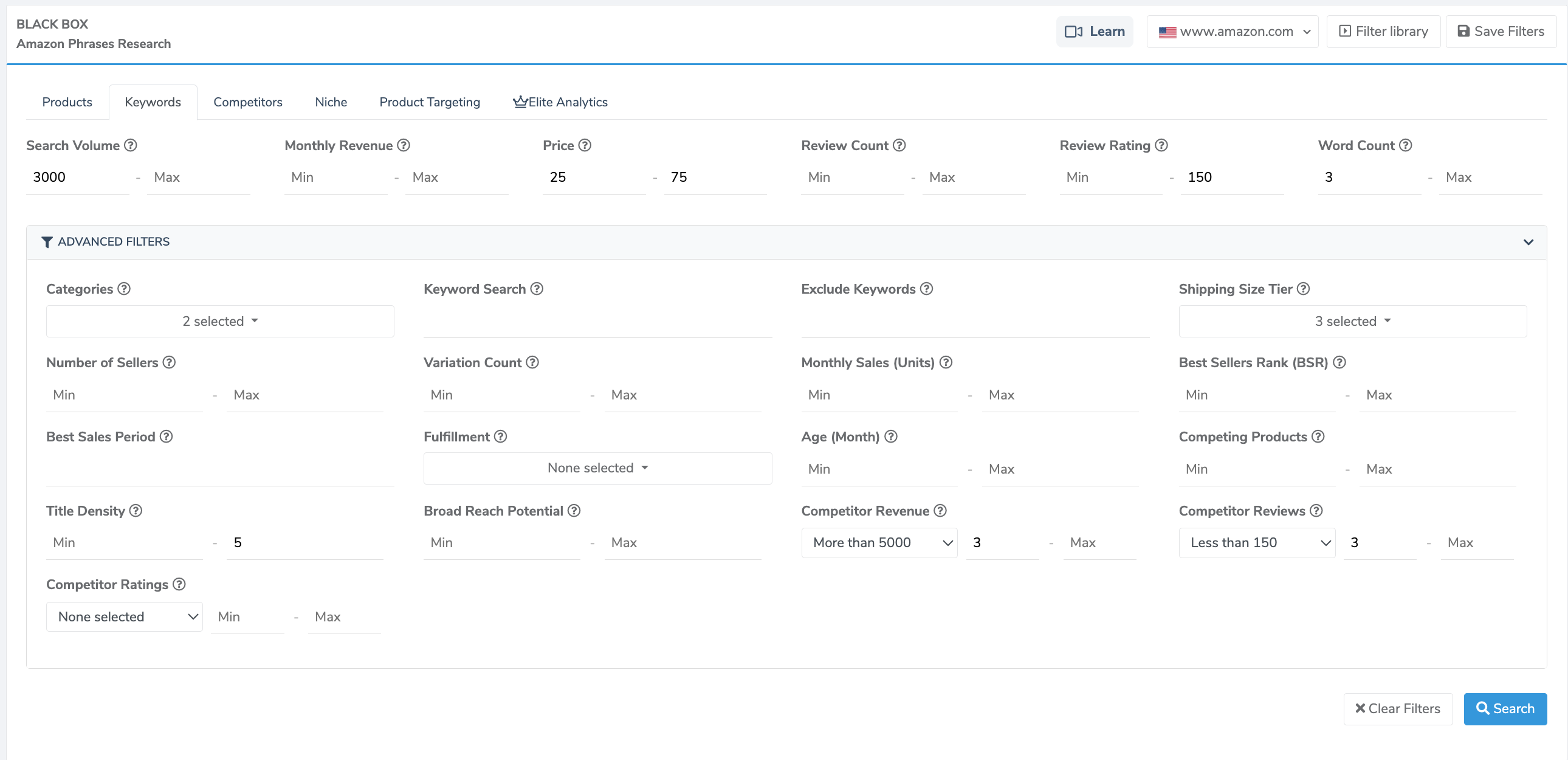
But you can also identify profitable products using a tool like BlackBox where you can employ several filters to hone in on products that fit the bill of what you are looking for.
If you have your Helium 10 account open, the products tab will output product pages that you can duplicate and optimize to hijack sales while the keywords tab will show you niches that are in demand with low competition.
The filters are there to help you filter the data as you see fit.
Perhaps you are a chef interested in producing an Amazon private label product in the Kitchen & Dining category, use our category filter to uncover profitable product ideas that may be suitable to your taste.
Maybe you want to ensure you will be able to rank easier and faster when you have the product listed. In that case, you can use a maximum on our title density feature. If we had a maximum title density of 5, it means we want to see only those keywords that have a maximum of five products on page one using the keyword inside of the title. Listen to a little bit more about title density on the Serious Sellers Podcast here.
It’s up to you. I encourage you to experiment with the tool and start building a shortlist of 15-30 product ideas that you can then further validate.
Find a Reputable Manufacturer
Finding a reputable manufacturer is pivotal for the success of your private label business. As I’ve mentioned before, Alibaba is a prominent platform where you can source manufacturers.
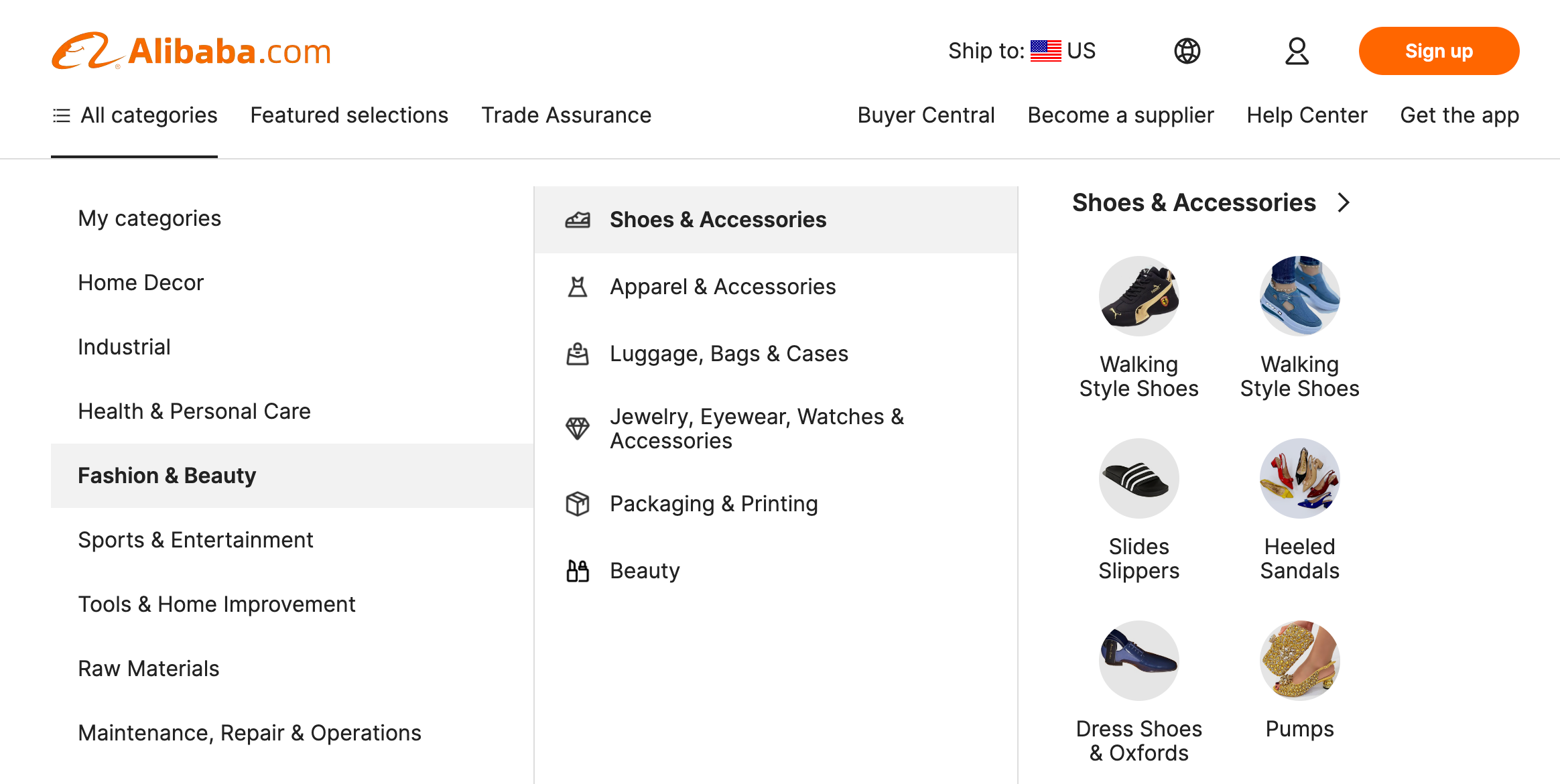
Once you have a product in mind, message several suppliers evaluating each one based on customer feedback and product quality. Engage in communication with potential manufacturers to assess their responsiveness, willingness to customize products, and adherence to quality inspection standards. Do a video call whenever possible to get in some face time and build trust. Request samples to inspect product quality firsthand.
The reason I say message several suppliers is not just to secure the best deal after comparing quality, pricing, and production capabilities, but also because you might need an additional supplier if you run out of stock too fast. This approach allows you to have complete control over the private label business model, enabling you to select the cheapest manufacturer while maintaining product quality. Additionally, ensure that the manufacturer is open to private labeling, which involves branding the products with your own brand label.
You can actually access suppliers from inside of Xray on our Chrome Extension as well using the bottom right-hand button that says “View Suppliers on Alibaba.”
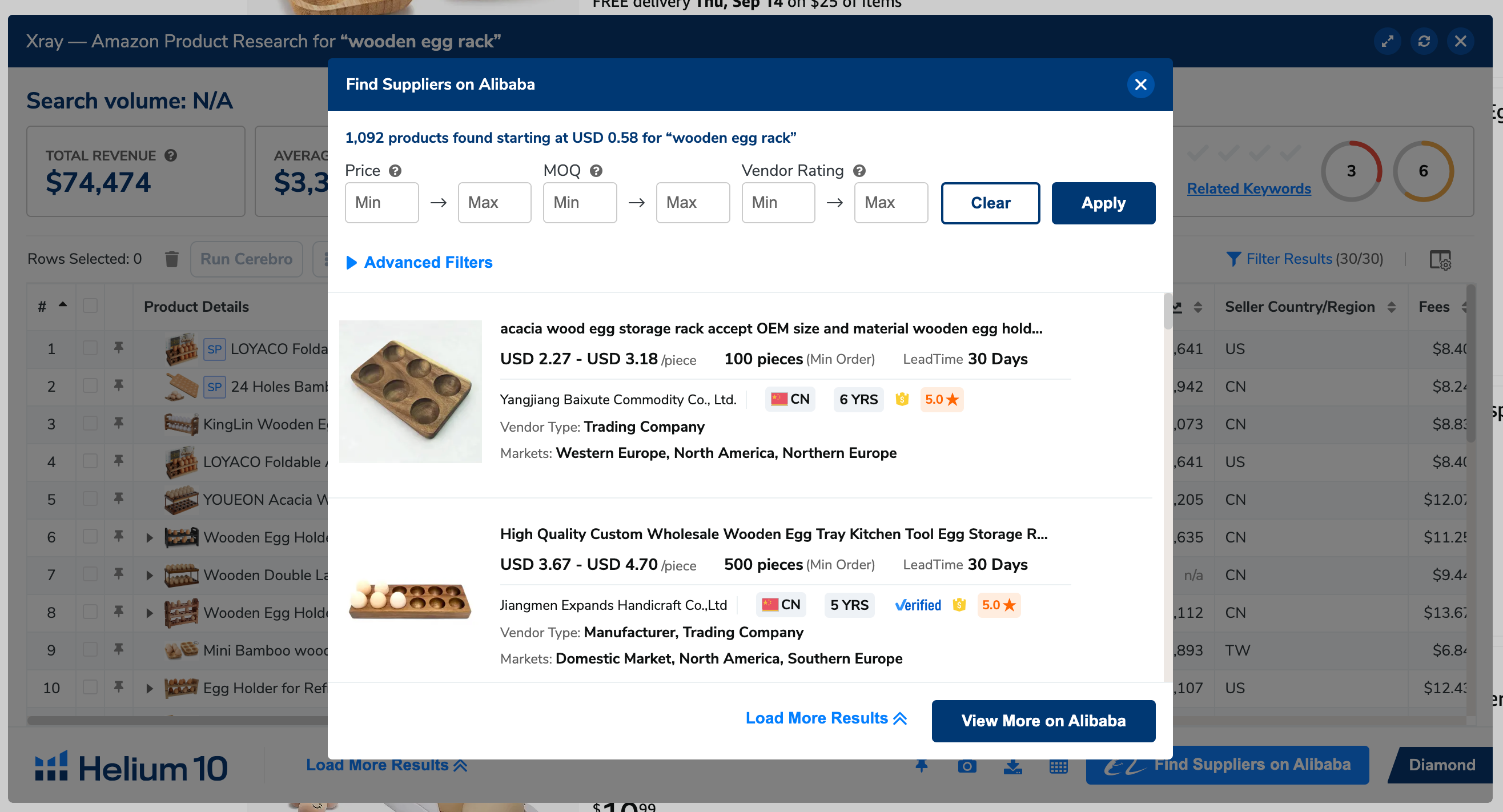
Having “trade assurance” and “verified suppliers” check-marked is always a good idea as it can provide additional coverage to protect brand owners incase something goes wrong.
Beyond Alibaba, other similar platforms exist, such as Global Sources and Made-in-China, where you can explore additional options and potentially discover reputable manufacturers for your private label venture. Remember, thorough research, due diligence, and effective communication are key to establishing strong partnerships with manufacturers and ensuring the success of your private label business.
Request Product Samples for Quality Control
Once you like a supplier or two, clearly communicate your intention to request samples for quality inspection.
Be specific about the number of samples you require and any particular attributes or aspects you want to evaluate. Ensure that you and your supplier are on the same page regarding the product’s specifications and quality standards.
Typically, suppliers are willing to provide samples either at a nominal cost or for free, although you may need to cover shipping expenses. Once you receive the samples, rigorously assess them for quality, consistency, and adherence to your requirements. Pay attention to factors like materials, workmanship, and any customizations you’ve requested.
If the samples meet your expectations, you can proceed with confidence, knowing that the product quality aligns with your standards. If issues arise, work closely with your supplier to address and rectify them before moving forward with production. Effective quality control through product sampling is fundamental to maintaining your brand’s reputation and customer satisfaction.
Select Your Brand’s Logo, Design, and Packaging
Designing your own brand’s logo, packaging, and overall brand identity is a crucial step when selling private label products and building a private label brand, especially on platforms like Amazon, where having an own unique brand can help you secure the buy box and stand out in the crowded marketplace. You should work on doing this either while you wait for samples to arrive or right as you place the order depending on if your sample was customized or not.
Canva is an excellent tool for creating your brand’s logo and design elements. With its user-friendly interface and pre-designed templates, you can easily customize your brand’s visual identity to match your vision.
For more intricate design work or to create a professional logo, platforms like Fiverr and Upwork are valuable resources. Here, you can find skilled graphic designers who can bring your branding concepts to life. Collaborating with freelancers allows for more tailored and unique designs that resonate with your target audience.
When designing your packaging, consider not only aesthetics but also functionality and compliance with regulations. Ensure that your packaging aligns with your brand’s identity and enhances the overall customer experience. This attention to design and branding elements can significantly contribute to your success when selling private label products on Amazon or elsewhere. Additionally, on Amazon, use Enhanced Brand Content to further showcase your brand’s story and uniqueness, ultimately helping you win over customers and establish a strong private label brand presence.
Manage Everything With Next-Level Software
Sign up now to access powerful, easy-to-use tools to help with every part of selling on Amazon and Walmart.
Choose Your Fulfillment Method
When deciding on the fulfillment method for your private label products, you should really be considering several critical factors.
Firstly, assess your business goals and resources. If you’re just starting your Amazon private label business or selling private label products on Amazon, utilizing Fulfillment by Amazon (FBA) can be advantageous.
With FBA, Amazon takes care of warehousing, packing, and shipping, allowing you to focus on growing your private label line and brand. It also makes your own private label products eligible for Prime and enhances your chances of securing the buy box, offering a competitive edge over other brands.
However, if you possess the infrastructure and capabilities to handle order fulfillment efficiently, you may opt for Fulfillment by Merchant (FBM). FBM grants you greater control over the fulfillment process, which can be beneficial for managing your own brands’ inventory and providing personalized customer experiences.
Ultimately, the choice between FBA and FBM for your private label seller business should align with your goals, resources, and the unique dynamics of your private label product.
Create Your Listing
Once your product is sourced and imported with potential help from a shipping logistics company, it’s time to evangelize your traffic!
When you’re in the nitty-gritty of creating your listing, the devil is always in the details. Pay close attention to crafting accurate product descriptions, highlighting those key features, and spelling out all the product specs. And don’t skimp on those images – they’re like your product’s online dressing room. High-quality images that give potential buyers a clear picture of what they’re getting can make a world of difference.
I won’t get into all the details here but check out this blog where I dive deep into how to write and reoptimize your listing!
At the End of the Day
Look, I’ve talked to hundreds if not thousands of sellers since entering this space and I fully believe you can whip up a private label listing on Amazon FBA that not only grabs the attention of customers but also sets a strong foundation for your private label business’s success.
It just comes down to taking action, persevering and making informed decisions based on data.
As you’ve journeyed through this guide, you’ve gained insights into the strategies, challenges, and rewards that come with creating your own brand on the world’s largest online marketplace.
Armed with a deeper understanding of product selection, branding, marketing, and customer engagement, you’re better equipped to embark on your private labeling adventure. You’re positioned to carve out your niche, captivate consumers, and thrive in the ever-evolving world of online commerce.
Now, all I can ask is will you take the leap?
Frequently Asked Questions
Determining whether a brand is private label can sometimes be a bit tricky because it’s not always explicitly stated. However, there are telltale signs and characteristics that can help you figure it out. One common indicator is if the brand has a generic or nondescript name that doesn’t convey a specific identity or heritage. Another clue is if you mainly find their products on one platform or retailer; this could indicate a private label created specifically for that marketplace. Also, keep an eye out for products from different brands that look remarkably similar in terms of design, features, and packaging – they might be private label products all sourced from the same manufacturer.
If you can only locate a brand’s products on a particular website, it could be a private label exclusive to that retailer. Private label brands often have a limited online presence, minimal social media activity, or limited marketing efforts outside of the platform where they’re sold. They usually lack a compelling backstory, history, or mission that more established brands often have. Pricing can be another giveaway, as private label products are often priced more competitively than well-known brands, aiming to offer value to consumers.
When it comes to packaging and design, private label products tend to have simpler or more generic packaging compared to established brands. Some retailers even use their in-house labels for private label products, which may have a different name from the retailer’s main brand. Lastly, private label brands often start with a limited product range within a specific niche and gradually expand as they gain traction. These are some key signs that can help you identify whether a brand is likely a private label.
You can definitely private label products sourced from Alibaba and sell them on Amazon. This involves selecting products from Alibaba’s platform, communicating with suppliers for customization and branding, getting samples, negotiating terms, ensuring product quality, and arranging shipping. Once you receive the products, you create Amazon listings, implement marketing strategies, and manage sales. While this approach offers flexibility and potential profitability, it also comes with challenges like quality control, logistics management, and competition. Thorough research, effective communication, and attention to detail are essential for a successful private labeling venture using Alibaba as a source for products.
When it comes to private labeling, whether you need permission from the manufacturer depends on the specific agreement you have with them. In many cases, manufacturers are quite open to the idea of private labeling their products. It’s a win-win situation for both parties; they get to sell more products, and you get to build your own brand. However, it’s essential to clarify this arrangement upfront. You should discuss private labeling with the manufacturer and come to a mutual agreement.
Typically, they’ll allow you to put your branding, logo, and label on the product, but they might have certain requirements or guidelines to follow. These could include things like minimum order quantities or specific design specifications for the labeling and packaging. It’s essential to have a clear understanding of these terms before you start private labeling.
In some cases, especially if you’re sourcing from a factory overseas, they may already be familiar with private labeling, and it might be a standard part of their business model. However, communication and documentation are key. Having a written agreement or contract in place that outlines the terms of your private labeling arrangement can help protect both you and the manufacturer.
So, to sum it up, while you often don’t need explicit permission to private label a product, it’s essential to discuss and agree upon the specifics with the manufacturer to ensure a smooth and successful private label business venture.
Achieve More Results in Less Time
Accelerate the Growth of Your Business, Brand or Agency
Maximize your results and drive success faster with Helium 10’s full suite of Amazon and Walmart solutions.